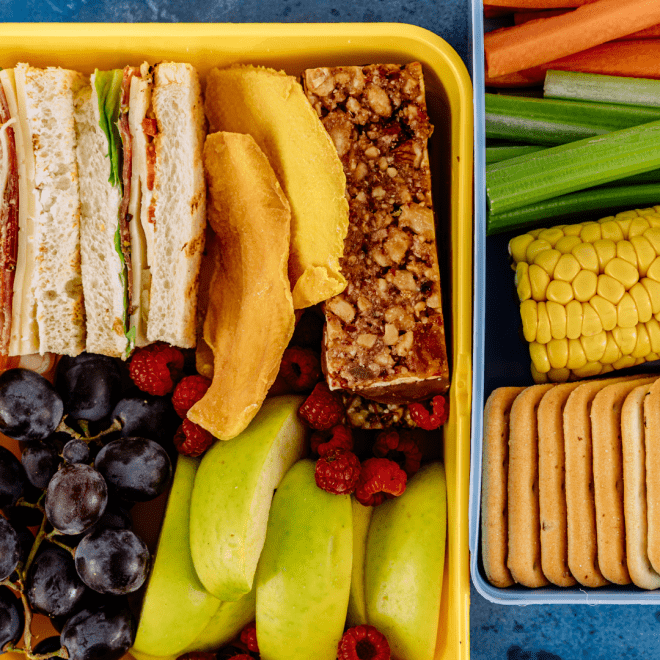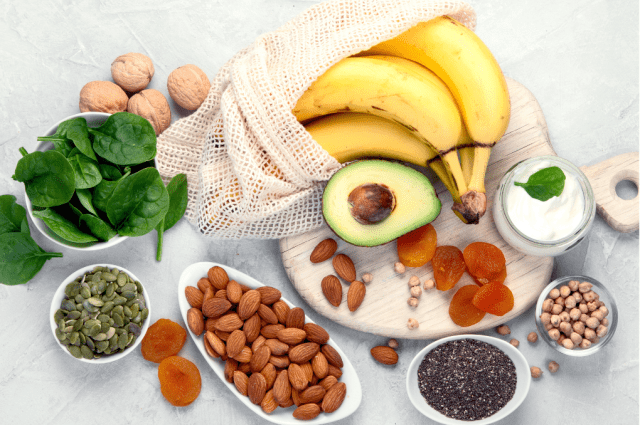Affordable, Healthy Snacks for College Students

Snacking is an essential part of every busy college student’s life. However, overindulging in processed and high-sugar snacks such as potato chips, candy bars, and cookies can have adverse health effects and impact academic performance. Luckily, there are plenty of affordable healthy snacks accessible on and off campus.
This blog post guides you through healthy snacking, including budgeting, nutrition, and snack ideas.
Why is healthy snacking important for college students?
Snacking on nutrient-dense foods provides the necessary fuel to power through long study sessions and keeps our focus sharp.
On the other hand, consuming unhealthy snacks can lead to blood sugar crashes and decreased energy levels. To avoid these adverse effects, it’s crucial to prioritize replacing junk food snacks with healthier options.
Considerations for Eating Healthy on a Budget
Eating healthy as a college student can be challenging between jam-packed schedules, limited budgets, and lack of cooking space. However, with some planning and research, fueling your body with great nutrition is possible!
Make a grocery list.
Planning your grocery shopping helps you make better snacking decisions. Without a list, you are much more likely to add items to your cart out of pure temptation, which quickly increases your grocery bill! Plan what you need ahead of time to prevent picking up unnecessary items.
Check for discounts.
Utilize the grocery store’s weekly circular to see what’s on sale. Many stores that sell groceries, including healthy snack options, like Sam’s Club and Walmart, offer student discounts if you present your student ID.
Buy store brands.
Name-brand snack foods are typically much more expensive than the store-brand versions, even though there is barely any difference in taste, quality, or ingredients. When you are shopping for groceries, it is a good idea to read the nutrition labels on the back of both the name-brand and store-brand packaging before making a final decision.
Choose in-season produce.
Fruits and vegetables in season are often less expensive than those out of season because they are more abundant, incur lower transportation and storage costs, and require less artificial support for growth. To find out what is available near your college campus, visit the websites of local farmer’s and green markets.GrowNYC, for example, is an excellent reference for finding out what is in season in colleges in the New York City area.
Skip the convenience.
Buying precut produce, snack bars, and other single-serve snacks can be more accessible, but that convenience comes with a higher price! Instead, wash and cut your produce and make healthy snacks at home.
Schedule time for meal prep.
Just like you keep a schedule for all your classes, carve out a time to shop and cook! Writing it down in your planner or plugging it into your digital calendar app makes you much more likely to do it. Eating healthy and saving money throughout the week will make you happy you did.
Guidelines for Healthy College Eating
So, what exactly does healthy snacking look like?
Balance your macronutrients.
Firstly, snacks should have a good balance of all three macronutrients—carbohydrates, protein, and fats—to help us meet our daily nutritional needs. Complex carbohydrates provide plenty of fiber to improve digestion, fats promote heart health and blood sugar stabilization, and protein helps keep us full until our next meal and avoid overeating.
Here are some examples of healthy snack ideas that are balanced with all three macronutrients:
- Carrots with hummus
- Rice cakes with peanut butter and banana slices
- Greek yogurt with berries and granola
- Cheese stick with apple slices
Practice mindful eating.
Practicing portion control and mindful eating is also essential when snacking. Always read the nutrition facts label for information on proper portion sizes. While eating (especially if you are distracted with schoolwork), check in with your body’s hunger and fullness cues to prevent overeating. Feeling comfortably full is a good indication that snack time is finished.
Getting Started: Healthy Snack Ideas
No-Cook Snack Ideas
Here are several quick and easy snacks that require minimal preparation and cooking time:
- Yogurt, fruit, and granola parfait
- Cheese sticks
- Trail mix
- Bell peppers with hummus
- Whole grain crackers with guacamole
- Apples and peanut butter
Quick and Portable Snacks
Try these snacks that you can take with you on the go:
Healthy Snacks Available on Campus
These are nourishing choices that you can likely buy from campus markets and dining halls:
- Pretzel and hummus cups
- Yogurt parfaits
- Kind bars
- RXBARs
- Popcorn
- Chobani Greek yogurt smoothies
- Fresh fruit cups
St. John’s University students can stock up on nourishing snacks like Greek yogurt, popcorn, cheese sticks, fresh fruit, protein bars, trail mix, and hummus at the markets in Marillac Hall or Montgoris Dining Hall.
Related: Explore healthier snack options at St. John’s University.
Great Online Resources for Eating Healthy
Several free, online resources share healthy, cost-effective recipes, and focus on easy-to-prepare, nutritious meals that fit your schedule and budget. Here are some of my personal favorites:
Blog Spotlight: Navigating Campus Dining for Nutritious Choices
Are you interested in maintaining a healthy diet while navigating campus dining options?
Check out my other blog post, “How to Eat Healthy in College: Nutrition Tips and Dining Options.” This piece offers advice on making nutritious choices, from simple nutrition tips to dorm-friendly meal prep ideas
Final Thoughts
Healthy snacking helps you feel your best and perform well in school. It’s essential to prioritize your nutrition, especially during your academic years! Maintaining a well-balanced, nourishing diet can be easy, affordable, time-efficient, and delicious.








